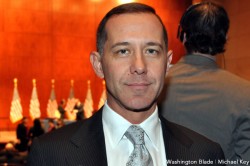National
Solmonese joins Obama campaign as national co-chair
HRC chief among 35 selected for role

The Obama campaign has tapped Human Rights Campaign President Joe Solmonese for a position as a national co-chair to advocate for the president based on his work for the LGBT community and the country as a whole.
On Wednesday, the Obama campaign issued a statement saying Solmonese had been selected for the role as part of a group of 35 individuals who had been chosen as national co-chairs.
In a statement, Solmonese praised Obama’s work on LGBT issues over the course of the more than three years the president has been in office, saying the president’s leadership “has brought about great change for LGBT Americans.”
“From ending ‘Don’t Ask, Don’t Tell,’ to prohibiting discrimination based on gender identity in the federal government, to signing the hate crime prevention act into law, the Obama administration has improved the lives of LGBT Americans more than ever before,” Solmonese said. “President Obama has made it clear that LGBT Americans deserve a fair shot and has taken steps across his administration to make the lives of those most in need in our community better.”
Others on the list include Senate Assistant Majority Leader Dick Durbin (D-Ill.), Sen. Jeanne Shaheen (D-N.H.), Los Angeles Mayor Antonio Villaraigosa, Chicago Mayor Rahm Emmanuel and actress Eva Longoria, who stars on ABC’s “Desperate Housewives.”
In a statement, Jim Messina, Obama for America’s campaign manager, said the national co-chairs “will be tremendous assets on the ground as we build the biggest grassroots campaign in history.”
“They each share the president’s vision for a future where every American can have a fair shot at success, where hard work pays off and responsibility is rewarded,” Messina said.
According to the Obama campaign statement, the national co-chairs are charged with serving as ambassadors for the president, advising the campaign on key issues and helping to engage and mobilize voters. The positions are unpaid.
Fred Sainz, vice president of communications for the Human Rights Campaign, said Solmonese’s role with the Obama campaign won’t be LGBT-specific and he’ll advocate for the president based on the entirety of his work.
“I think that Joe, obviously, will be most impactful in terms of speaking on behalf on the issues important to our community, but Joe will be able to speak to the entirety of the president’s record,” Sainz said.
Solmonese is slated to leave his post as HRC president when his contract expires on March 31, 2012. Sainz said Solmonese will begin his role with the Obama campaign immediately and continue his role for the president after he’s left the organization.
The complete list of the 35 national co-chairs follows:
· Lynnette Acosta – OFA volunteer leader from Florida
· Marc Benioff – CEO of Salesforce.com
· Senator Michael Bennet – U.S. Senator from Colorado
· Mayor Julian Castro – Mayor of San Antonio
· Governor Lincoln Chafee – Governor of Rhode Island
· Ann Cherry – Retired teacher and OFA volunteer leader from North Carolina
· Representative Judy Chu – Representing the 32nd District of California
· Representative Emanuel Cleaver – Representing the 5th District of Missouri
· Bill Daley – Former White House Chief of Staff to President Obama, former U.S. Secretary of Commerce
· Maria Elena Durazo – Executive Secretary-Treasurer of the Los Angeles County Federation of Labor, AFL-CIO
· Senator Dick Durbin – U.S. Senator from Illinois
· Mayor Rahm Emanuel – Mayor of Chicago
· Senator Russ Feingold – Former U.S. Senator from Wisconsin
· Representative Charles A. Gonzalez – Representing the 20th District of Texas
· Loretta Harper – High School Counselor and OFA volunteer leader from Nevada
· Attorney General Kamala Harris – Attorney General of California
· Sai Iyer – Student at Virginia Commonwealth University and OFA volunteer leader from Virginia
· Caroline Kennedy – Author/President of the John F. Kennedy Library Foundation
· Eva Longoria – Actress and Philanthropist
· Felesia Martin – OFA volunteer leader from Wisconsin
· Bishop Vashti McKenzie – African Methodist Episcopal Bishop
· Attorney General Tom Miller – Attorney General of Iowa
· Kalpen Modi – Actor/Former White House Associate Director for the Office of Public Engagement
· Admiral John Nathman – Retired U.S. Navy Admiral
· Governor Deval Patrick – Governor of Massachusetts
· Secretary Federico Pena – Former U.S. Secretary of Transportation and U.S. Secretary of Energy
· Elaine Price – Retired Ohio resident and OFA volunteer leader from Ohio
· Penny Pritzker – Founder and CEO of PSP Capital Partners
· John Register – U.S. Army Veteran and Paralympian
· Representative Jan Schakowsky – Representing the 9th District of Illinois
· Senator Jeanne Shaheen – U.S. Senator from New Hampshire
· Joe Solmonese – President of the Human Rights Campaign
· Alan Solow – Partner at DLA Piper LLP and past Chairman of the Conference of Presidents of Major American Jewish Organizations
· Governor Ted Strickland – Former Governor of Ohio
· Mayor Antonio Villaraigosa – Mayor of Los Angeles
New York
Two teens shot steps from Stonewall Inn after NYC Pride parade
One of the victims remains in critical condition

On Sunday night, following the annual NYC Pride March, two girls were shot in Sheridan Square, feet away from the historic Stonewall Inn.
According to an NYPD report, the two girls, aged 16 and 17, were shot around 10:15 p.m. as Pride festivities began to wind down. The 16-year-old was struck in the head and, according to police sources, is said to be in critical condition, while the 17-year-old was said to be in stable condition.
The Washington Blade confirmed with the NYPD the details from the police reports and learned no arrests had been made as of noon Monday.
The shooting took place in the Greenwich Village neighborhood of Manhattan, mere feet away from the most famous gay bar in the city — if not the world — the Stonewall Inn. Earlier that day, hundreds of thousands of people marched down Christopher Street to celebrate 55 years of LGBTQ people standing up for their rights.
In June 1969, after police raided the Stonewall Inn, members of the LGBTQ community pushed back, sparking what became known as the Stonewall riots. Over the course of two days, LGBTQ New Yorkers protested the discriminatory policing of queer spaces across the city and mobilized to speak out — and throw bottles if need be — at officers attempting to suppress their existence.
The following year, LGBTQ people returned to the Stonewall Inn and marched through the same streets where queer New Yorkers had been arrested, marking the first “Gay Pride March” in history and declaring that LGBTQ people were not going anywhere.
New York State Assemblywoman Deborah Glick, whose district includes Greenwich Village, took to social media to comment on the shooting.
“After decades of peaceful Pride celebrations — this year gun fire and two people shot near the Stonewall Inn is a reminder that gun violence is everywhere,” the lesbian lawmaker said on X. “Guns are a problem despite the NRA BS.”
New York
Zohran Mamdani participates in NYC Pride parade
Mayoral candidate has detailed LGBTQ rights platform

Zohran Mamdani, the candidate for mayor of New York City who pulled a surprise victory in the primary contest last week, walked in the city’s Pride parade on Sunday.
The Democratic Socialist and New York State Assembly member published photos on social media with New York Attorney General Letitia James, telling followers it was “a joy to march in NYC Pride with the people’s champ” and to “see so many friends on this gorgeous day.”
“Happy Pride NYC,” he wrote, adding a rainbow emoji.
Mamdani’s platform includes a detailed plan for LGBTQ people who “across the United States are facing an increasingly hostile political environment.”
His campaign website explains: “New York City must be a refuge for LGBTQIA+ people, but private institutions in our own city have already started capitulating to Trump’s assault on trans rights.
“Meanwhile, the cost of living crisis confronting working class people across the city hits the LGBTQIA+ community particularly hard, with higher rates of unemployment and homelessness than the rest of the city.”
“The Mamdani administration will protect LGBTQIA+ New Yorkers by expanding and protecting gender-affirming care citywide, making NYC an LGBTQIA+ sanctuary city, and creating the Office of LGBTQIA+ Affairs.”
U.S. Supreme Court
Supreme Court upholds ACA rule that makes PrEP, other preventative care free
Liberal justices joined three conservatives in majority opinion

The U.S. Supreme Court on Friday upheld a portion of the Affordable Care Act requiring private health insurers to cover the cost of preventative care including PrEP, which significantly reduces the risk of transmitting HIV.
Conservative Justice Brett Kavanaugh authored the majority opinion in the case, Kennedy v. Braidwood Management. He was joined by two conservatives, Chief Justice John Roberts and Justice Amy Coney Barrett, along with the three liberal justices, Sonia Sotomayor, Elena Kagan, and Ketanji Brown-Jackson.
The court’s decision rejected the plaintiffs’ challenge to the Affordable Care Act’s reliance on the U.S. Preventative Services Task Force to “unilaterally” determine which types of care and services must be covered by payors without cost-sharing.
An independent all-volunteer panel of nationally recognized experts in prevention and primary care, the 16 task force members are selected by the secretary of the U.S. Department of Health and Human Services to serve four-year terms.
They are responsible for evaluating the efficacy of counseling, screenings for diseases like cancer and diabetes, and preventative medicines — like Truvada for PrEP, drugs to reduce heart disease and strokes, and eye ointment for newborns to prevent infections.
Parties bringing the challenge objected especially to the mandatory coverage of PrEP, with some arguing the drugs would “encourage and facilitate homosexual behavior” against their religious beliefs.
-

 U.S. Supreme Court3 days ago
U.S. Supreme Court3 days agoSupreme Court upholds ACA rule that makes PrEP, other preventative care free
-

 U.S. Supreme Court4 days ago
U.S. Supreme Court4 days agoSupreme Court rules parents must have option to opt children out of LGBTQ-specific lessons
-

 National5 days ago
National5 days agoEvan Wolfson on the 10-year legacy of marriage equality
-

 Congress4 days ago
Congress4 days agoSenate parliamentarian orders removal of gender-affirming care ban from GOP reconciliation bill













